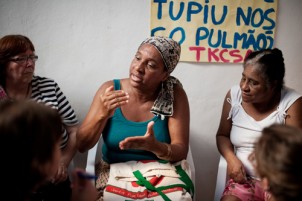
Those that participated in the Rio+20 conference must have noticed that the UN was proud to ‘compensate’ all carbon emissions from the conference through buying credits from Brazilian CDM projects (CDM or Clean Development Mechanism is one of several schemes to trade in carbon emissions). How kind of them.
But wait a minute. What happened with the scientific research that indicated long time ago that most of these carbon credits are fake? Did the stock market for CDM credits not crash years ago? Did they read our report on the path of destruction the CDM is leaving behind in Africa? But most crucially: does the UN actually know what is going on in the Brazilian CDM projects they so kindly support?
It would not have been hard to give it a quick check. One Brazilian CDM project lies at only a day-trip visiting distance from the conference center. For some reason, a day-trip to see the result of this ‘generosity’ was not proposed. A large German steel complex, funded by the National Bank of Brazil, is very active there in polluting the air and water with heavy metals and destroying local ecosystems that formed the livelihood of thousands of fishing families. TKCSA, owned by the German company ThyssenKrupp opened in 2010 a large steel plant, just 500 meters from the houses at Santa Cruz, west of Rio de Janeiro. Ever since, a ‘silver rain’ pours down on the surrounding population. More details on that horror story are in this interesting article: http://www.bastamag.net/article2495.html (credits to Jean de Pena and Sophie Chapelle!)
ThyssenKrupp pays private militia to keep their security intact, while using dirty tactics to attack everyone from activists to researchers. We reported earlier that researchers from EJOLT partner Fiocruz are being sued for evaluating impacts caused by ThyssenKrupp in Santa Cruz. So should we be happy that the UN ‘compensated’ the carbon emissions from Rio+20 by giving millions to such companies?
To be clear; the conflict these fishermen have is unrelated to the conflict other fishermen have in another bay close to Rio de Janeiro – and in which two fishermen were recently killed. The point here is to illustrate that struggles for environmental justice are by no means isolated cases. For anyone who has followed EJOLT so far it is clear that the problems are by no means bound to Brazilian borders or to fishermen either. There is a global pattern that EJOLT is making clear to anyone who cares to listen: a pattern of a powerful nexus between states and large corporations imposing their pollution and damage to those without power, by hook and by crook. They now even have the arrogance to do it in name of saving the planet and working for the green economy.
But people are raising their voice and they receive support from all corners of the planet. David already won a battle with Goliath when some 5700 fishermen managed to force ThyssenKrupp to pay a few million euro in compensations, in January 2011. But that only partly pays for the damage they suffered and continue to suffer as the pollution and injustice go on. A strong global movement for environmental justice is urgently needed.
Photos : © Jean de Pena

The project ENVJUSTICE has received funding from the European Research Council (ERC) under the European Union’s Horizon 2020 research and innovation programme (grant agreement No. 695446)